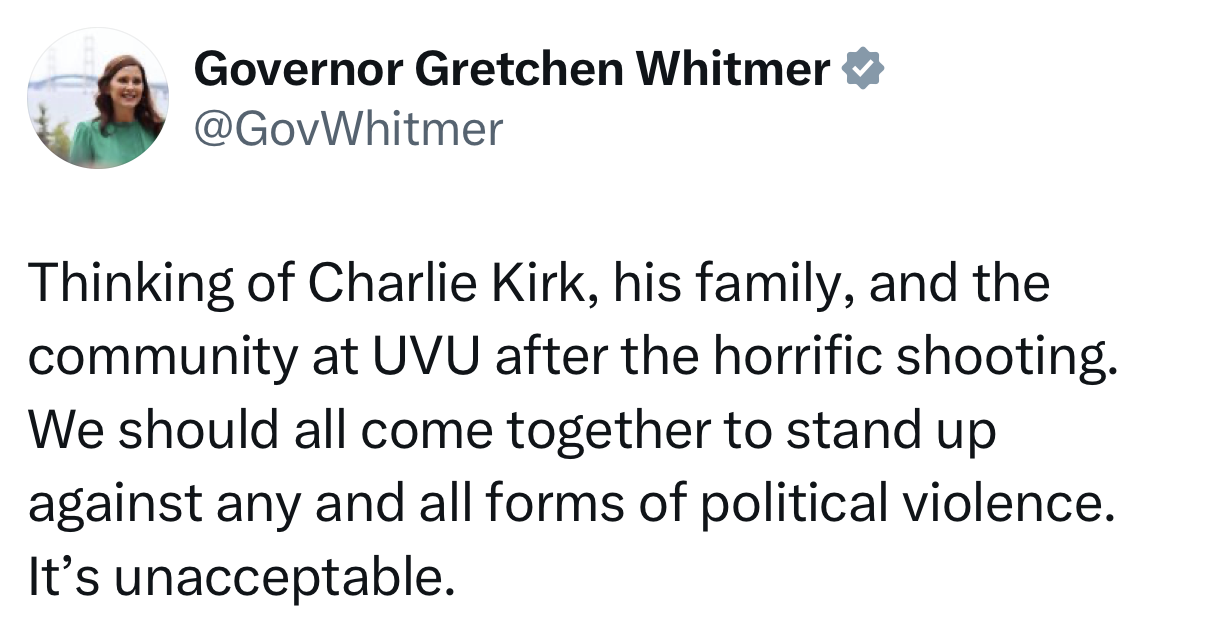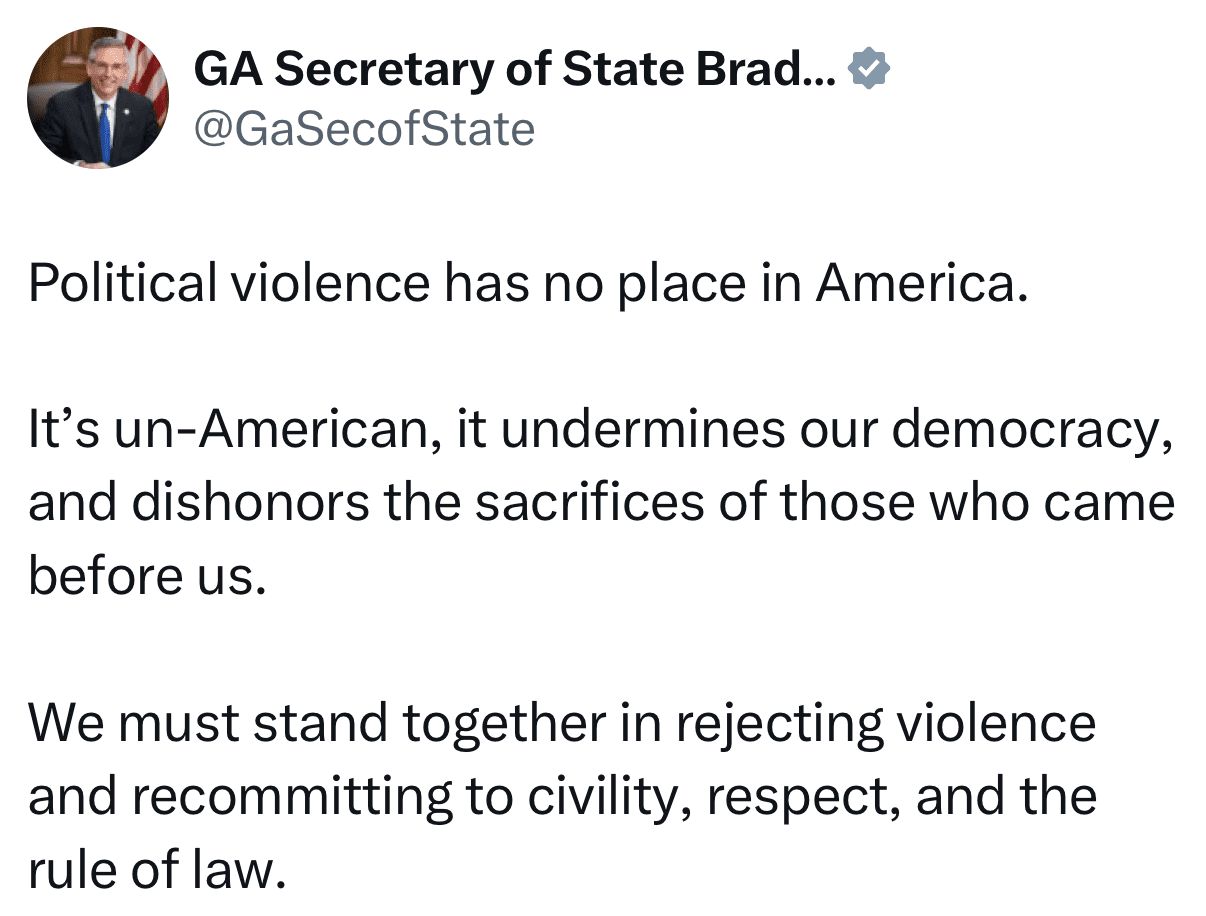Americans Widely Reject Political Violence
In This Resource
State leaders from both sides of the aisle are condemning all forms of political violence following the fatal shooting of political activist Charlie Kirk.
Kirk, a leading conservative voice and a close ally of President Trump, was shot and killed at an event at a Utah college on Sept. 10. His death has reignited concerns around political violence.
Political violence is not novel in American history, but recent high-profile events have renewed concern. Those instances include the April 2025 arson attack at Pennsylvania Gov. Josh Shapiro’s official residence, the July 2024 attempted assassination of Trump at a campaign rally, and the June 2025 killing of Minnesota House Speaker Melissa Hortman and her husband, Mark.
But as that concern grows, it’s clear that Americans across parties broadly reject political violence and view it as a problem.
In recent years, States United has fielded surveys of thousands of Americans to determine their attitudes on political violence on an ongoing basis. The results consistently show that Americans are concerned about political violence and that they overwhelmingly oppose it. This is true for Americans of all political parties.
In line with those attitudes, many state leaders have condemned political violence in all its forms, and called for calm and dialogue, attempting to tamp down any potential escalation.
“No matter who you are or what you believe, there is never a place for violence in our politics,” said Joanna Lydgate, president and CEO of States United.
Americans by a wide margin oppose political violence.
More than 9 in 10 Americans say they oppose election violence, according to a survey conducted in partnership with YouGov in November 2024. The results are similar across party lines, with 91% of both Republicans and Democrats and 86% of independents opposing election-related violence.
However, the survey found that 4 in 10 Americans believed that members of the opposing party are committing acts of violence and harassment. The survey also showed the more people believe this, the less safe they feel voting.
A survey that States United and YouGov conducted ahead of the 2022 midterm elections found that an overwhelming majority of respondents saw political violence against political opponents as a problem and opposed it.
Americans also believe political violence is going up.
In a June 2025 survey from States United, more than half (57%) of Americans said political violence is a major problem. That number was steady for years but rose substantially after the Minnesota shootings. In that same survey, 78% of Americans believe that political violence has increased—the highest percentage for that question over a two-year period.
The results show that leaders should communicate to voters that people across all political parties overwhelmingly reject violence and harassment in politics to shift perceptions.
In our democracy, everyone—elected leaders, candidates, election officials, people who go to political rallies, and voters everywhere—must be safe to participate.
As soon as news broke that Kirk had been shot, Democratic and Republican state leaders quickly expressed concern for him and his loved ones and condemned all forms of political violence, sentiments they continued to share after they learned he had not survived the attack.
At a subsequent press conference with law enforcement officials, Utah Gov. Spencer Cox said he was worried about our nation and mentioned several recent cases of political violence, including the Minnesota shootings and the arson attack against Shapiro.
“We desperately need leaders in our country, but more than the leaders, we just need every single person in this country to think about where we are and where we want to be,” Cox said.
Wyoming Gov. Mark Gordon said the greatness of this country is based on the rights guaranteed in the U.S. Constitution.
“As citizens, we must take this moment to reaffirm our commitment to protecting our ability to speak openly on our views without fear,” he said. “Political violence must never be tolerated.”
Oklahoma Gov. Kevin Stitt and Maryland Gov. Wes Moore issued a bipartisan statement condemning political violence and urging cooler, calmer rhetoric.
“As governors, we stand together—Republicans and Democrats—in condemning political violence in every form,” they said. “We call on leaders and citizens alike to reject violence, lower the temperature, and recommit to civility, respect, and the rule of law.”
Michigan Gov. Gretchen Whitmer, who was the target of an attempted kidnapping in 2020, posted on X to condemn the shooting.
“We should all come together to stand up against any and all forms of political violence,” she wrote. “It’s unacceptable.”
Nevada Attorney General Aaron Ford said the shooter needs to be held accountable.
“Political violence has no place in our communities — against anyone, anywhere, for any reason,” he wrote on X, adding, “The person responsible MUST be held accountable under the law.”
Georgia Secretary of State Brad Raffensperger pointed to the threat that political violence poses to democracy.
“It’s un-American, it undermines our democracy, and dishonors the sacrifices of those who came before us,” he wrote. “We must stand together in rejecting violence and recommitting to civility, respect, and the rule of law.”
This small snapshot shows that state leaders from both sides of the aisle agree: All political violence undermines our democracy, and all Americans should stand against it.

